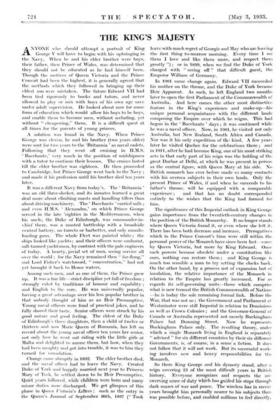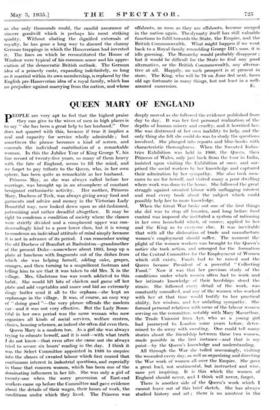THE KING'S MAJESTY
ANYONE who should attempt a portrait of King George V will have to begin with his upbringing in the Navy. When he and his elder brother were boys,- their father, then Prince of Wales, was determined that they should not he educated as he had himself been. Though the motives of Queen 'Victoria and the Prince Consort had been the highest, it is generally agreed that the methods winch they followed in bringing up their eldest son were mistaken. The future Edward VII had been tied rigorously to books and tutors, and never allowed to play or mix with boys of his own age save under adult supervision. He looked about now for some form of education which would allow his boys to be boys, and enable them to become men, without secluding, yet without " cheapening," them. It is a difficult quest at all times for the parents of young princes.
A solution was found in the Navy. When Prince George was eleven, he and his brother (two years older) were sent for two years to the 'Britannia ' as naval cadet4. Following that they went off cruising in H.M.S.
Bacchante,' very much in the position of midshipmen with a tutor to continue their lessons. The cruises lasted till the cider brother was eighteen. He then proceeded to Cambridge, but Prince George went back to the Navy ; and made it his profession until his brother died ten years later.
It was a different Navy from today's. The ' Britannia' was an old three-decker, and its inmates learned a great deal more about climbing masts and handling tillers than about driving machinery. The ' Bacchante ' carried sails ; and even H.M.S. ' Alexandra,' on which Prince George served in the late 'eighties in the Mediterranean, when his uncle, the Duke of Edinburgh, was commander-in- chief there, was a masted or with a broadside central battery, no turrets or barbettes, and only muzzle- loading guns. The whole Fleet was painted white ; the ships looked like yachts ; and their officers were sunburnt, salt-tanned yachtsthen, by contrast with the pale engineers of today. A hearty, jovial set of men, seeing service all over the world ; for the Navy remained then " far-flung," and Lord Fisher's ivatch*Ord, " concentration," had not yet brought it hack to Home waters.
Among such men, and as one of them, the Prince grew up. It was a line lifestrictdiscipline yet full of freedom ; strongly ruled by traditions of honour and capability; and English to the core. He was universally popular, having a great advantage over his less popular brother in that nobody thought of hini as an Heir PresumptiVe. Young naval officers were fond of practical jokes, and he fully shared their taste. Senior officers were struck by his good nature and good feeling. The eldest of the Duke of Edinburgh's three daughters, then a child of twelve or thirteen and now Marie Qneen of Rumania, has left on record about the young naval officer ten years her senior, not only how he went out riding with the little girls at Malta and delighted to amuse, them, but how, when they had been naughty and got into trouble, it was to him they turned for consolation.
Change came abruptly in 1892. The elder brother died, and the naval officer had to leave the Navy. Created Duke of York and happily_ married next year to Princess Mary of 'reek, he settled clown to be Heir Presumptive. Quiet years followed, while children were boin and many minor duties were discharged. We get glimpses of this phase in Queen Victoria's Late,:s;. such as the entry- in the Queen's Journal of September 30th, 1897 (" Took leave with much regret of Georgie and May who arc leaving the first thing to-morrow morning. Every time I see them I love and like them more, and respect them greatly ") ; or in 1899, when we find the Duke of York charged with " seeing off 7. that difficult guest, the Emperor William of Germany.. In 1901 came change again. Edward VII succeeded his mother on the throne, and the Duke of York became Heir Apparent. As such, he left England two months later to open the first Parliament of the Commonwealth of Australia. And here comes the other most distinctive feature in the King's experience and make-up--his unique personal acquaintance with the different lands composing the Empire over which he reigns. This had begun in the ' Bacchante ' days ; it was continued while he was a naval officer. Now, in 1901, he visited not only Australia, but New Zealand, South Africa and Canada. Nor was it his only expedition of th3 kind. A few years later he visited Quebec for the celebrations there ; and in 1911, after he had become King, one of his most striking acts in that early part of his reign was the holding of the great Durbar at Delhi, at which he was present in person as the central figure, with Queen Mary at his side. No British monarch has ever before made so many contacts with his oversea subjects in their own lands. Only the present Prince of Wales, if and when he succeeds to his father's throne, will be equipped with a 'comparable experience ; and that has no doubt corresponded entirely to the wishes that the King had formed for him.
The significance of this Imperial outlook in King George gains importance from the twentieth-century changes in the position of the British Monarchy. It no longer stands where Queen Victoria found it, or even where she left it. There has been both decrease and increase. Prerogatives which in the Prince Consort's time were still within the personal power of the Monarch have since been lost—sonic by Queen Victoria, but more by King EdWard. Once such powers become obsolete under a constitution like ours, nothing can restore them ; and King George is .much too sensible a man to try setting the clocks back. On the other hand, by a process not of expansion but of insulation, the relative importance of the Monarch in relation to the Empire has greatly increased. For as regards its self-governing units—those which comprise what is now termed the British Commonwealth of Nations —he is today the. sole remaining 'formal link. Before the 'War, that was not so ; the Government and Parliament at Westminster were still Imperial in relation to Dominions as well as Crown Colonies ; and the GoVernor-General of Canada orlitistralia represented not merely Buckingham Palace_ but Downing Street. Now he represents 13uckingham Palace only. The resulting' theory, under which a 'Single Monarch living in England is seParately " advised " for six different countries by their six different GOveindientS, is, of coUrse,- in a -sense a fiction. It does not follow that it will not work. But its successful work- ing involves new and heavy responsibilities- for the Monarch.
So there King George and his dynasty stand, after a reign covering 25 of the most difficult years in British history 'Everyone reeOgnizes and respects the un- swerving sense of dtity ~which has guided his steps thrOugh dark. mazes-of war and peace. the-Wireless has in recent years brought him personally nearer to his subjects than was possible before, and enabled millions to -feel directly, as else only thousands could, the candid assurance of sincere goodwill which is perhaps his most .striking quality. Without abating the dignified externals of royalty, he has gone a long way to discard the clumsy German trappingsin which the Hanoverians had invested it. The lines on which he reconstituted the House of Windsor were typical of his common sense and his appre- ciation of the democratic British outlook. The German idea of a princely caste, expanding indefinitely, .so long as it married within its own membership, is replaced by the English pre-Hanoverian idea of a royal family, which has no prejudice against marrying from the nation, and whose offshoots, as soon as they are offshoots, become merged in the nation again. The dynasty itself has still valuable functions to fulfil towards the State, the Empire, and the British Commonwealth. What might happen if we went back to a Royal family resembling George III's sons. it is idle guessing. The Monarchy would probably disappear ; but it would be difficult for the State to find any good alternative, or the British Commonwealth, any alterna- tive at all. Happily, no such prospect is at present in store. The King, who will be 70 on June 3rd next, faces old age fortunate in many things, but not least in a well-















































 Previous page
Previous page